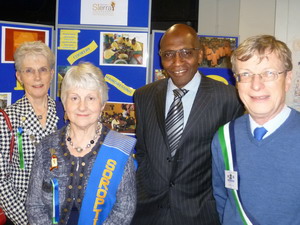 Soroptimists from South Lancashire Region and Cheshire, North Wales & Wirral Region are working in partnership with the International Slavery Museum (ISM), in Liverpool. This collaboration links Soroptimist International’s “Project SIerra: a family and a future” with the museum’s “42: Women of Sierra Leone”, a photographic exhibition by Lee Karen Stow. To mark the 50th anniversary of independence in Sierra Leone, the two regions organised a special day at the ISM.
Soroptimists from South Lancashire Region and Cheshire, North Wales & Wirral Region are working in partnership with the International Slavery Museum (ISM), in Liverpool. This collaboration links Soroptimist International’s “Project SIerra: a family and a future” with the museum’s “42: Women of Sierra Leone”, a photographic exhibition by Lee Karen Stow. To mark the 50th anniversary of independence in Sierra Leone, the two regions organised a special day at the ISM.
South Lancashire’s President, Jenny Stanistreet, chaired the day’s proceedings. Many Soroptimists from both regions acted as stewards, assisted in directing members of the public to the venue, and generally were available to talk about aspects of Soroptimism.
The first speaker was Dr Fred Nye, Secretary of the Waterloo Partnership. He outlined the achievements of this local charity – a collaboration between people in Waterloo and Crosby (near Liverpool) and their namesake community near Freetown. This initiative was started after a visit to Sierra Leone by the (then) MP for Crosby – and member of Soroptimist International – Claire Curtis-Thomas.
Anne MacDonald, Quadrennial Project Liaison Officer, then gave a presentation on Project SIerra and showed the project’s film.
The keynote speaker was Professor Tunde Zack-Williams, Professor of Sociology at Central Lancashire University, a member of the Sierra Leone Association Merseyside (SLAM), and also a trustee of Hope and Homes for Children. Professor Zack-Williams gave a fascinating talk on the history of Sierra Leone during the fifty years since independence and this generated a number of questions and interesting discussion.
Dr Nye and Anne MacDonald repeated their earlier presentations. An extra feature was a short session by three local school students who had recently visited Sierra Leone on an exchange, facilitated by the Waterloo Partnership and the British Council. They each described their visit from a different perspective.
The Museum supplied a BSL interpreter throughout the day, and also provided refreshments. The event was well attended and, during breaks between presentations, there was opportunity for people to view the displays and talk to the speakers and Soroptimists present.

